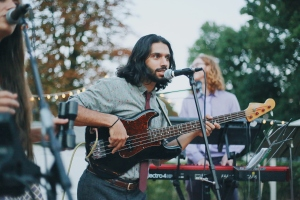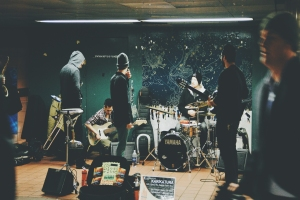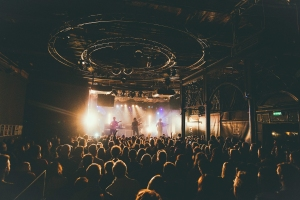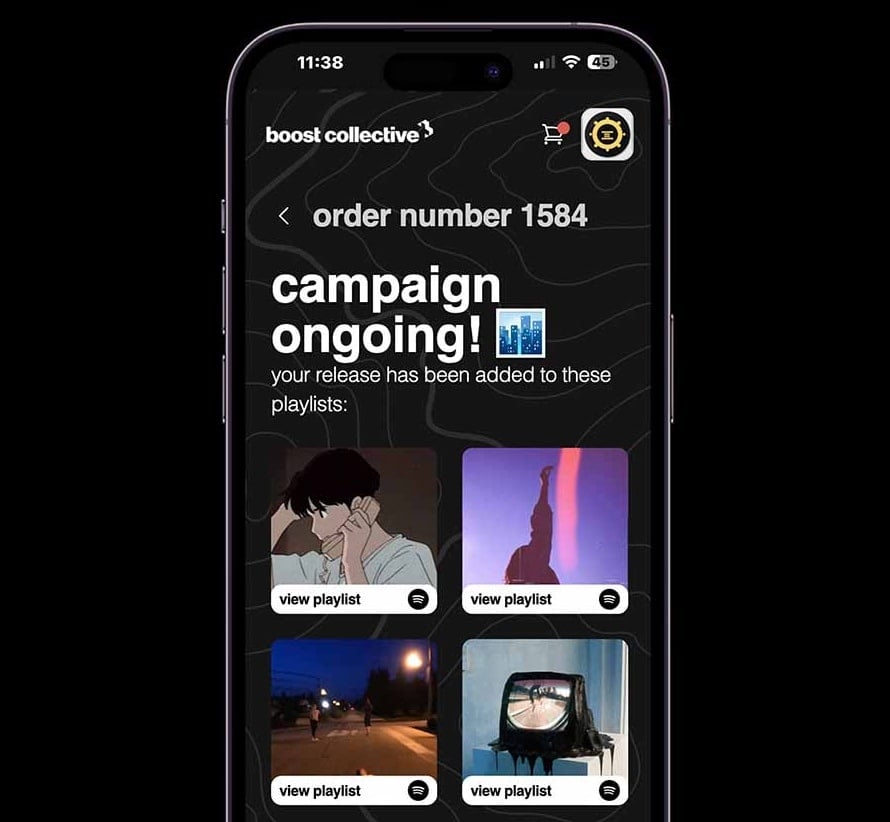Overview
Are you a musician looking to take your career to the next level in 2024?
With the music industry constantly evolving, it's important to stay up to date on the latest strategies for promoting your music and growing your fanbase.

Introduction
In today's digital age, the power of social media and online platforms cannot be underestimated when it comes to promoting independent artists and music.
With great music and the right techniques, you can reach a wider audience and connect with fans like never before.
However, it can be overwhelming to navigate through all the differences and myriad of options available.
If you're serious about promoting your music and making a name for yourself in 2023, you need to be strategic and creative.
There are numerous ways to effectively promote your music online, and build a strong fanbase.
In this feature, we will explore the top strategies music marketing plan, and techniques that will give you a competitive edge in the music industry this year.
The Evolving Music Industry In 2024
-
Continued Growth of Streaming: The shift from physical sales to digital streaming has been ongoing for years, and it's likely to continue in 2023. Streaming platforms such as Spotify, Apple Music, Amazon Music, and others may see increased subscribership and revenue.
-
Rise of New Platforms: While major streaming platforms dominate the market, there may be room for emerging platforms that cater to niche audiences or focus on specific types of content or interactive experiences.
-
Augmented Reality (AR) and Virtual Reality (VR) Integration: Musicians and labels might explore integrating AR and VR technologies to create immersive music experiences for fans. Virtual concerts and interactive music videos could become more prevalent.
-
Blockchain and Cryptocurrency Adoption: Blockchain technology and cryptocurrencies could play a more significant role in the music industry. Smart contracts might be used to facilitate fairer and more transparent royalty payments for artists and creators.
-
Personalized Music Experiences: As AI and machine learning continue to advance, music streaming services might offer highly personalized playlists, song recommendations, and tailored content based on individual preferences.
-
More Independent Artists and DIY Culture: With the rise of digital distribution and social media, independent artists might find it easier to reach audiences directly, reducing the dependency on traditional record labels.
-
Sustainability and Environmental Awareness: The music industry might become more conscious of its environmental impact, leading to eco-friendly practices in concert production, merchandising, and packaging.
-
Music Copyright and Licensing Reforms: The ongoing discussions around copyright and licensing might lead to more streamlined and fairer processes for using music in different media, benefiting both artists and content creators.
-
Live Music's Recovery: After the COVID-19 pandemic, the live music industry may continue its recovery with larger-scale concerts, festivals, and tours making a comeback.
-
Continued Challenges of Piracy and Copyright Infringement: Despite efforts to combat piracy, copyright infringement may still pose challenges for the industry, leading to ongoing debates on how to protect artists' intellectual property.
Importance Of Effective Music Promotion
Effective music promotion is crucial for independent musicians and artists to gain recognition, build a fan base, and achieve success in the music industry.
Here are some key reasons why effective music promotion is important:
-
Increased Visibility: In today's digital age, there is an overwhelming amount of music available online. Effective promotion helps cut through the noise and increases the visibility of an artist's work. It allows their music to reach a wider audience and stand out among the competition.
-
Building a Fan Base: Music promotion helps in creating a dedicated fan base. Engaging with fans and keeping them informed about new releases, upcoming events, and behind-the-scenes content fosters a sense of connection and loyalty, leading to long-term support.
-
Opportunities for Collaboration and Gigs: A well-promoted artist is more likely to attract the attention of other musicians and industry professionals. This can lead to collaboration opportunities, features on playlists, and invitations to perform at events and gigs.
-
Monetization and Revenue Generation: For artists looking to make a living from their music, effective promotion is essential. It can lead to increased streams, downloads, merchandise sales, and ticket purchases, all of which contribute to the artist's revenue stream.
-
Record Label and Industry Interest: Record labels and industry professionals are more likely to take notice of an artist who already has a strong following and a track record of successful self-promotion. This can open doors to potential record deals or partnerships.
-
Credibility and Recognition: Effective music promotion helps build credibility in the eyes of both fans and the industry. A well-promoted artist is seen as serious about their craft, which can lead to more opportunities for exposure and recognition.
-
Feedback and Improvement: Engaging with the audience through promotion allows artists to receive feedback on their music. This feedback can be valuable for improving their work and understanding what resonates with their listeners.
-
Staying Relevant: The music industry is constantly evolving, and artists need to stay relevant to remain in the spotlight. Regular promotion and engagement help artists stay connected with their audience and adapt to changing trends.
-
Personal Branding: Effective music promotion is not just about promoting the music but also about establishing and maintaining the artist's brand. A strong and consistent brand identity helps artists create a unique image that sets them apart from others.
-
Emotional Connection: Music is a powerful medium that can evoke emotions and create meaningful connections. Effective promotion helps artists share their stories and connect with their audience on a deeper level, fostering a loyal and engaged fan base.

Build A Strong Online Presence
Building a strong online presence for music promotion is crucial in today's digital age.
It allows you to make music independently reach a wider audience, engage with fans, and establish yourself as a professional musician.
Here are some steps to help you achieve this:
-
Create a Professional Website: Start by building a website that showcases your music, bio, photos, upcoming events, and links to your social media profiles. Use a clean and user-friendly design, and make sure the site is mobile-responsive.
-
Leverage Social Media: Establish a presence on major social media platforms such as Facebook, Instagram, Twitter, and YouTube. Regularly post updates, behind-the-scenes content, and teasers of new music, and interact with your followers.
-
Consistent Branding: Use consistent branding across all your online channels, including your website, social media profiles, album artwork, and promotional materials. This helps create a recognizable identity for your music.
-
YouTube Channel: YouTube is a powerful platform for musicians. Upload high-quality music videos, lyric videos, live performances, and vlogs to engage with your audience and attract new fans.
-
Music Streaming Platforms: Distribute your music on major streaming platforms like Spotify, Apple Music, Amazon Music, and others. Promote your music by creating playlists, collaborating with influencers, and encouraging fans to follow you on these platforms.
-
Engage with Fans: Respond to comments and messages from your fans promptly. Engage with them by running contests, Q&A sessions, and sharing user-generated content.
-
Blog and Content Creation: Start a blog on your website where you can share stories, insights, and updates about your music journey. Additionally, create other forms of content like podcasts or video series to diversify your online presence.
-
Email Marketing: Collect email addresses from your website and social media followers to build a mailing list. Send regular newsletters with exclusive content, tour dates, and updates about your music.
-
Collaborate and Network: Collaborate with other musicians, artists, and influencers in your genre. Networking and cross-promotion can help you reach new audiences.
-
Live Streaming and Virtual Concerts: Organize live streaming events and virtual concerts to connect with fans worldwide. Platforms like Twitch, YouTube Live, or Facebook Live can be useful for this purpose.
-
SEO Optimization: Use search engine optimization (SEO) techniques to improve your website's visibility in search engines. This can help potential fans discover your music more easily.
-
Paid Advertising: Consider using paid advertising on social media platforms and search engines to reach a broader audience. Target your ads based on demographics, interests, and location.
-
Analytics and Insights: Utilize analytics tools provided by social media platforms and website builders to track your online performance. Analyze data to understand what content resonates with your audience and adjust your strategy accordingly.
Leverage Video Content
Leveraging video content for music promotion can be a powerful way to reach a wider audience and connect with your fans.
In today's digital age, videos releasing music are highly shareable and have the potential to go viral, which can significantly boost your music's exposure.
Here are some tips on how to effectively use video content for music promotion:
-
Create High-Quality Music Videos: Invest in creating professional and visually appealing music videos. A well-produced music video can capture the attention of viewers and leave a lasting impression. Ensure that the video complements the theme and mood of your song.
-
Share on Video Platforms: Upload your music videos to popular video-sharing platforms like YouTube, Vimeo, and Dailymotion. YouTube, being the second-largest search engine after Google, is an essential platform for music promotion.
-
Optimize Video Titles and Descriptions: Use relevant keywords in your video titles and descriptions to improve search visibility. Think about what potential viewers might search for when looking for music similar to yours.
-
Promote Behind-the-Scenes Content: Share behind-the-scenes videos of your music video shoots or studio recording sessions. This kind of content provides insight into your creative process and can build a deeper connection with your audience.
-
Lyric Videos: If you don't have the budget for a full-blown music video, consider creating lyric videos. These can still be engaging and provide your audience with a visual way to connect with your music.
-
Collaborate with YouTubers and Influencers: Partner with popular YouTubers or influencers who have a significant following and align with your music genre. They can feature your music in their videos or create content related to your music.
-
Live Performances and Acoustic Sessions: Record and upload live performances or acoustic sessions. This can showcase your talent and authenticity, and viewers often enjoy watching musicians in a more raw and unplugged setting.
-
Engage with Your Audience: Respond to comments on your videos, engage with your fans, and encourage them to share your videos. Building a strong community around your music can lead to increased loyalty and word-of-mouth promotion.
-
Cross-Promote on Social Media: Share your music videos across your social media platforms. Each platform has its unique audience, and cross-promotion can help you reach a broader demographic.
-
Run Video Ad Campaigns: Consider running targeted video ad campaigns on platforms like YouTube, Facebook, and Instagram to reach new audiences and gain more exposure.
-
Use Analytics to Measure Performance: Take advantage of the analytics provided by video platforms to track the performance of your videos. This data can give you insights into audience demographics, watch times, and engagement levels.

Harness The Power Of Streaming Services
Harnessing the power of streaming services for music distribution is essential for independent artists and even established musicians.
In recent years, streaming platforms have become the primary method of music consumption, allowing artists to reach a global audience with ease.
Here are some steps to effectively distribute your music through streaming music offline services:
-
Prepare High-Quality Audio: Ensure your music is professionally recorded, mixed, and mastered. High-quality audio is crucial to make your music stand out on streaming platforms.
-
Choose a Digital Distributor: To get your music on major streaming platforms like Spotify, Apple Music, Amazon Music, and more, you'll need a digital music distributor. Some popular distributors include DistroKid, TuneCore, CD Baby, and AWAL (Artists Without a Label). Compare their features, pricing, and royalty rates before making a decision.
-
Create Compelling Cover Art and Metadata: Your album or single cover art is the first thing listeners see. Make it eye-catching and reflective of your music's style. Additionally, fill out all the metadata fields accurately, including artist name, album/song title, genre, and release date.
-
Choose the Right Release Date: Consider the best time to release your music. Think about your target audience, the genre of your music, and any relevant events or holidays that could boost visibility.
-
Promote Your Release: Before the release date, build anticipation through social media, email newsletters, and other marketing channels. Consider reaching out to music blogs and playlists to feature your music.
-
Leverage Streaming Playlists: Getting your songs featured on popular playlists can significantly increase your visibility. Reach out to playlist curators and use tools like Spotify for Artists to pitch your tracks to editorial playlists.
-
Utilize Social Media and Content Marketing: Engage with your fans on social media and use platforms like YouTube to create compelling music videos and behind-the-scenes content. This will help build your brand and attract more listeners.
-
Collaborate and Cross-Promote: Collaborate with other artists or influencers to expand your reach. Cross-promotion allows you to tap into each other's fan bases, increasing your overall exposure.
-
Analyze and Adapt: Use analytics provided by streaming platforms to understand your audience better. Identify which songs are performing well and in which regions. This data can guide your future marketing and touring decisions.
-
Stay Consistent: Regularly release new music to keep your audience engaged and grow your fanbase. Consistency is key to building momentum on streaming platforms.
Collaborate With Other Artists And Producers
Collaborating with other artists and producers can be an excellent strategy for music promotion, as it can help you reach new audiences, gain credibility and industry connections, and enhance your creative output. Here are some steps and tips to effectively collaborate for music promotion:
-
Identify Potential Collaborators: Look for artists and producers whose musical style complements yours or who have a similar target audience. You can discover potential collaborators through social media platforms, music forums, local events, or industry networking events.
-
Build Relationships: Before jumping into a collaboration, take the time to build relationships with potential collaborators. Follow them on social media, engage with their content, attend their shows, and genuinely show interest in their work. Building rapport will make it easier to approach them for collaboration.
-
Define Your Goals: Discuss and agree on the objectives of the collaboration. It could be to create a new track, remix each other's songs, perform together at a show, or any other creative endeavor. Having clear goals will help you stay focused throughout the process.
-
Establish Communication Channels: Set up effective communication channels, such as email, messaging apps, or project management tools. Smooth communication is crucial for brainstorming ideas, sharing feedback, and coordinating tasks.
-
Leverage Each Other's Platforms: Cross-promote each other on your social media channels, websites, and streaming platforms. Sharing teasers, behind-the-scenes footage, and updates about the collaboration will pique the interest of your respective fan bases.
-
Create Engaging Content: Besides the music itself, think about creating engaging content around the collaboration. This could include making a music video, a documentary-style video about the making of the song, or even live-streaming a joint studio session.
-
Utilize Each Other's Skills: Collaborating allows you to combine your strengths. If one of you excels at social media marketing, let them handle the promotion on those platforms. If the other has a knack for visual art, they can handle the artwork and visuals associated with the collaboration.
-
Tap into Local Events and Venues: If possible, perform together at local events or venues. This will give you both exposure to each other's fan bases and potentially attract new fans who are interested in collaborations.
-
Be Respectful and Open-Minded: Be open to compromise and new ideas during the collaboration. Treat each other's opinions with respect, as this will lead to a more fruitful creative process and foster a positive working relationship.
-
Release and Promote the Collaboration: Once the collaboration is ready, plan a joint release and combine your promotional efforts. Share it on streaming platforms, send it to music blogs, and encourage your fans to share it with their networks.
Engage With Your Fans
Engaging with your music fans is a crucial aspect of music promotion.
Building a strong and dedicated fan base can greatly enhance your music career and help you reach new audiences.
Here are some effective ways to engage with your fans via social media platforms for music promotion:
-
Social Media Presence: Maintain an active presence on various social media platforms such as Facebook, Instagram, Twitter, TikTok, and YouTube. Post regularly, share updates about your music, and interact with your followers by responding to comments and messages.
-
Live Streaming: Host live streaming sessions where you can perform your music, interact with fans in real time, answer questions, and even take song requests. Platforms like Twitch, Instagram Live, and YouTube Live are great for this purpose.
-
Create Engaging Content: Aside from your music, create interesting and engaging content related to your journey as an artist, behind-the-scenes footage, Q&A sessions, and collaborations with other musicians.
-
Email Newsletter: Start a mailing list and encourage your fans to subscribe. Send out regular newsletters with exclusive updates, sneak peeks of new music, and upcoming tour dates.
-
Fan Contests and Giveaways: Organize fun contests or giveaways for your fans. It could be a chance to win exclusive merchandise, concert tickets, or even a personal video call with you.
-
Collaborate with Fans: Involve your fans in your creative process by seeking their input on potential song ideas, and artwork designs, or even inviting them to participate in your music videos.
-
Personalized Communication: Whenever possible, reply to direct messages, comments, and emails personally. Show genuine interest in your fans' support and feedback.
-
Fan Meetups: Organize fan meetups before or after your shows. This can help you connect with your fans on a deeper level and show them your appreciation.
-
Utilize Hashtags: Incorporate relevant and trending hashtags in your social media posts to increase visibility and reach a broader audience.
-
Stay Authentic: Be yourself and show your personality through your interactions. Authenticity helps create a stronger connection with your fans.
-
Engage in Music Communities: Participate in online music forums, Facebook groups, and subreddits related to your genre. Share your music and interact with fellow musicians and fans.
-
Collaborate with Influencers: Partner with influencers and bloggers in your niche who have a significant following to promote your music to a wider audience.

The Wrap-Up
In conclusion, promoting your music in 2024 requires a combination of online and offline strategies.
Embrace social media, collaborate with influencers and artists, create engaging content, and prioritize live performances and upcoming releases.
With dedication, persistence, and strategic music promotion tips, you can increase your chances of breaking through the music industry and achieving your dreams.
